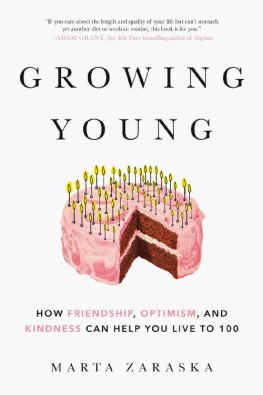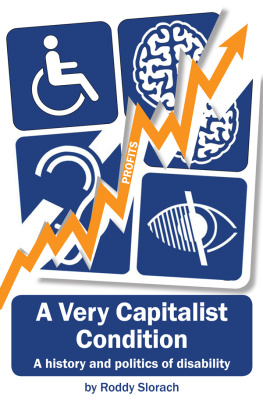Marta Russell - Capitalism and Disability
Here you can read online Marta Russell - Capitalism and Disability full text of the book (entire story) in english for free. Download pdf and epub, get meaning, cover and reviews about this ebook. publisher: Lightning Source Inc. (Tier 3), genre: Politics. Description of the work, (preface) as well as reviews are available. Best literature library LitArk.com created for fans of good reading and offers a wide selection of genres:
Romance novel
Science fiction
Adventure
Detective
Science
History
Home and family
Prose
Art
Politics
Computer
Non-fiction
Religion
Business
Children
Humor
Choose a favorite category and find really read worthwhile books. Enjoy immersion in the world of imagination, feel the emotions of the characters or learn something new for yourself, make an fascinating discovery.
- Book:Capitalism and Disability
- Author:
- Publisher:Lightning Source Inc. (Tier 3)
- Genre:
- Rating:3 / 5
- Favourites:Add to favourites
- Your mark:
- 60
- 1
- 2
- 3
- 4
- 5
Capitalism and Disability: summary, description and annotation
We offer to read an annotation, description, summary or preface (depends on what the author of the book "Capitalism and Disability" wrote himself). If you haven't found the necessary information about the book — write in the comments, we will try to find it.
Capitalism and Disability — read online for free the complete book (whole text) full work
Below is the text of the book, divided by pages. System saving the place of the last page read, allows you to conveniently read the book "Capitalism and Disability" online for free, without having to search again every time where you left off. Put a bookmark, and you can go to the page where you finished reading at any time.
Font size:
Interval:
Bookmark:
Capitalism & Disability

MARTA RUSSELL (December 20, 1951December 15, 2013) Photo by John Scheele.
Capitalism &
Disability
SELECTED WRITINGS
BY MARTA RUSSELL
Edited by Keith Rosenthal

2019 Keith Rosenthal
Introduction Marta Russell and Ravi Malhotra
Published in 2019 by
Haymarket Books
P.O. Box 180165
Chicago, IL 60618
773-583-7884
www.haymarketbooks.org
ISBN: 978-1-60846-716-7
Distributed to the trade in the US through Consortium Book Sales and Distribution (www.cbsd.com) and internationally through Ingram Publisher Services International (www.ingramcontent.com).
This book was published with the generous support of Lannan Foundation and Wallace Action Fund.
Special discounts are available for bulk purchases by organizations and institutions. Please call 773-583-7884 or email for more information.
Cover design by Rachel Cohen.
Printed in Canada by union labor.
Library of Congress Cataloging-in-Publication data is available.
10 9 8 7 6 5 4 3 2 1

Editors Preface
The present volume is a systematic and representative collection of the uniquely insightful writings of the late author and activist, Marta Russell (December 20, 1951December 15, 2013).
Russell was born in the heart of the Mississippi Delta and grew up on her familys cotton farm. By the time she had reached young adulthood, the civil rights movement of the 1960s was in full swing across the South, and Russell gravitated to the center of it. She soon found herself in Jackson, Mississippi, volunteering for the American Civil Liberties Union (ACLU) in the struggle against racial segregation. There she witnessed the full brutality of the Jackson Police Departmentbeatings and arrests of friends and comrades; destruction of underground newspapers and organizations.
Russell was growing increasingly politicized during this period, but she did not yet think of disability in political terms, nor in connection with the struggle for civil rights taking place around her. Indeed, although she was born with cerebral palsy (and attendant mobility impairments), she was well into her thirties before such thoughts crossed her mind. Russell moved to Los Angeles, California, in the mid-1970s. There she began a career working in the film industry and, shortly thereafter, raising a daughter. In the late 1980s, Russell developed further mobility impairments, and she began using a wheelchair. Before long, she found it increasingly prohibitive to continue working in the industry and eventually came to rely on Social Security Disability Insurance (SSDI) payments as a means of supporting herself and her child.
Slowly Russell met more disabled people, in particular, more disabled activists, who introduced her to the notion of disability as a political concept. She became involved with disability activist organizations such as ADAPT (American Disabled for Accessible Public Transit, later renamed simply to the word ADAPT) and Not Dead Yet. She organized protests against the economic oppression of disabled people as carried out by both political parties in Washington. She also continued her activism with the ACLU and participated in demonstrations against the 2003 US war on Iraq.
Simultaneously, Russell rapidly developed her political ideology. She engaged in extensive studies of the works of Noam Chomsky, Howard Zinn, Frances Moore Lapp, Angela Davis, Karl Marx, and a plethora of other left-wing intellectuals. In 1994 she produced an award-winning documentary, Disabled and the Cost of Saying I Do, on the structural injustices faced by SSDI recipients considering marriage (injustices which remain unresolved to this day). In 1998 she published her first and only book, Beyond Ramps: Disability at the End of the Social Contract, which brought her the attention and praise of such pioneering socialist disability theorists as Vic Finkelstein and Mike Oliver.
Over the next seven to ten years, Russell further developed, refined, and reformulated her arguments on the nature of disability oppression under the system of capitalism. She authored a slew of essays which appeared in an array of publications. Those essays comprise the subject and contents of this book.
Marta Russell was by no means the first to explore the connection between capitalism and disabilityor the notion that disability itself is a form of oppression conditioned by the historical-material circumstances of society. Rather, her genius resides in the scope and depth with which she excavated such phenomena.
In particular, Russell went further than anyone else in specifically rooting disability oppression under capitalism in explicitly Marxist terms. For Russell, the oppression of disabled people in the modern (i.e., capitalist) world is no mere historical accident or tangential symptom of the dominant social system. Rather, capitalism and disability are structurally, necessarily, and ontogenetically linked in a dialectical process of mutual reinforcement.
Utilizing Marxs concepts regarding the nature of classes, wage labor, exploitation, the rate of profit, market competition, the reserve army of labor, and the bourgeois state, Russell identified the oppression of disabled people as an inextricable constituent component of the operation of the capitalist mode of production itself.
Drawing out the strategic implications of such a theoretical analysis was Russells other major political contribution. Russell fully supported all legislative reforms and programs that in any way protected, aided, or advanced the interests of disabled people in the US. Nonetheless, she maintained profound criticisms of the ultimate efficacy of a liberal civil rights-based approach which eschewed confrontation with the rooted structural relations of capitalism.
The Americans with Disabilities Act (ADA) of 1990 often figures as a centerpiece of Russells critiques in this vein. Given that the ADA is hailed as a landmark piece of civil rights legislation, akin to the Civil Rights Acts, it makes sense that disabled people and disability rights advocates would have high expectations of this putatively-sweeping reform. Sadly, upon close scrutiny, the ADA has fallen far short of any grandiose emancipatory hopes.
Though some have mischaracterized Russells position as being wholly dismissive of anything worthwhile in the ADA, this is demonstrably not the case. In chapter 4 of this book, Russell provides an extended example of how the more progressive aspects of the ADA can be used as an instrument to highlight and even remedy rampant instances of disability discrimination. The problem, according to Russell and other like-minded critics, is that the ADA is so infrequently utilized to this end, and, in those cases where it is brought into play, is so frequently interpreted in the most narrow and feckless mannerif not outright defied with relative impunity. Moreover, the progressive aspects of the ADA are arguably overwhelmed by the many flaws, caveats, and contradictions which are contained within the law as conceived and written.
In the years since Marta Russell wrote the enclosed pieces, some of the shortcomings of the ADA have come under revision by Congress. In response to two decades in which US courts had interpreted nearly all meaning and applicability out of the ADA, President Bush signed into law the ADA Amendments Act (ADAAA) of 2008. The stated purpose of the ADAAA was to redefine the term disability itself in a more expansive manner than hitherto. While this more inclusive definition is certainly welcome, the ADAAA in fact promised and delivered little in terms of correcting the misuses and abuses of the ADA.
Next pageFont size:
Interval:
Bookmark:
Similar books «Capitalism and Disability»
Look at similar books to Capitalism and Disability. We have selected literature similar in name and meaning in the hope of providing readers with more options to find new, interesting, not yet read works.
Discussion, reviews of the book Capitalism and Disability and just readers' own opinions. Leave your comments, write what you think about the work, its meaning or the main characters. Specify what exactly you liked and what you didn't like, and why you think so.













